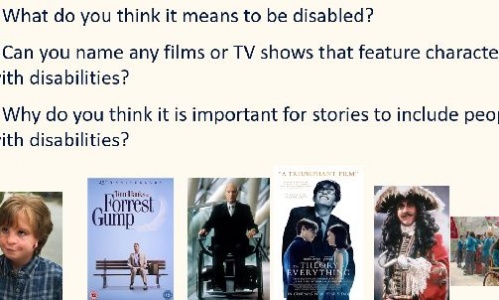Today, Team Williams debated whether people who are not disabled should play disabled characters in TV and film.
We looked at the key vocab below:
Representation: The way people, ideas, or characters are shown in media like films and TV.
Disability: A condition that makes it difficult for someone to do certain activities; it can be physical or mental.
Authenticity: Being genuine and true, especially in how a character is portrayed.
Advocacy: Support or promotion of a particular cause or idea, like the rights of disabled people.
Stereotypes: Simplified and widely held ideas about a particular group of people that may not be true.
And discussed some examples from films such as Wonder, The X Men, Forest Gump, Wicked and Peter Pan.
Finally, we chose a side and used the below to give our opinions.
Arguments For Disabled Actors Playing Disabled Characters
1.Authenticity and Representation: Disabled actors bring lived experiences and authenticity to their roles, leading to more nuanced and accurate portrayals of disability. This helps audiences better understand the realities of living with a disability.
2.Opportunities for Disabled Actors: The entertainment industry has historically excluded disabled actors. Casting disabled actors in these roles creates much-needed opportunities for a marginalized group.
3.Combatting Stereotypes: Disabled actors can challenge and subvert stereotypes by portraying their own experiences, offering a more realistic and diverse representation of disability.
4.Cultural Sensitivity: Casting able-bodied actors in disabled roles can be seen as a form of "cripface," similar to blackface, which is widely condemned. Using disabled actors helps avoid this insensitivity.
5.Community Empowerment: When disabled actors are cast, it empowers the disability community and promotes inclusion and equity in the arts.
Arguments Against Disabled Actors Playing Disabled Characters
1.Limited Casting Pool: Some productions may struggle to find disabled actors who meet the specific acting requirements, especially in less populated or resource-rich areas.
2.Artistic Freedom: Acting involves portraying experiences different from one's own. Restricting roles based on actors' identities could limit artistic exploration and storytelling.
3.Boxing Actors In: If disabled actors are only cast in disabled roles, this might limit their opportunities to play diverse characters, reinforcing stereotypes rather than breaking them.
4.Audience Expectations: Some productions may prioritize well-known actors to attract larger audiences, even if they are not disabled. This decision could be driven by financial and marketing considerations.
5.Logistical Challenges: Certain disabilities might make long hours on set or specific physical demands challenging for disabled actors, potentially complicating production schedules.
What do you believe?

